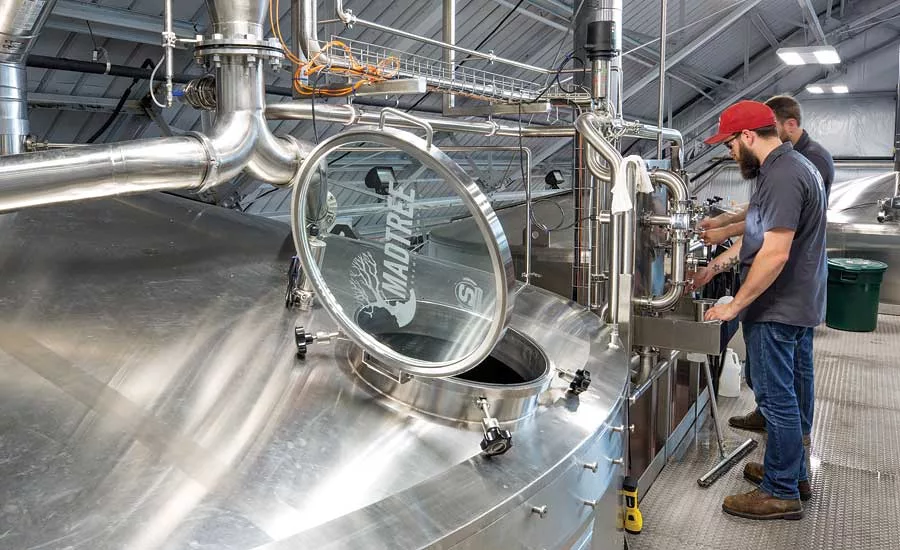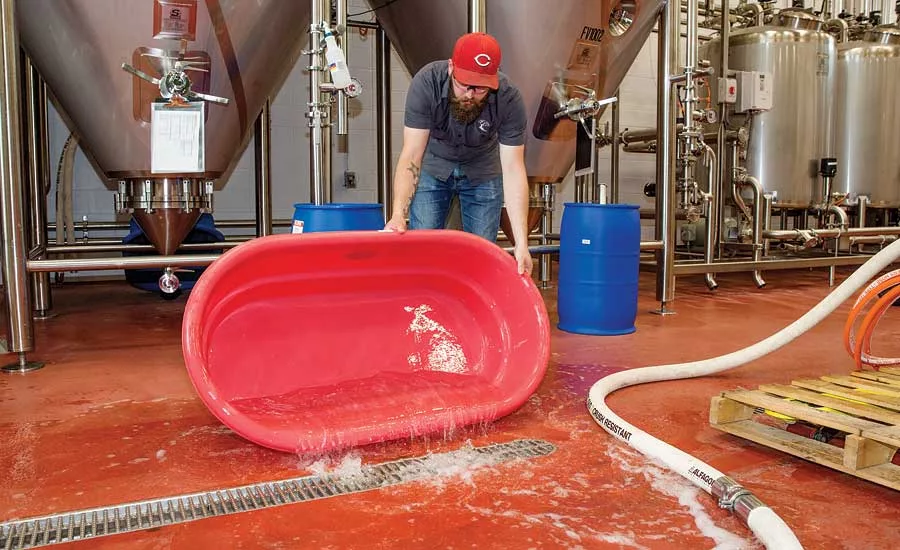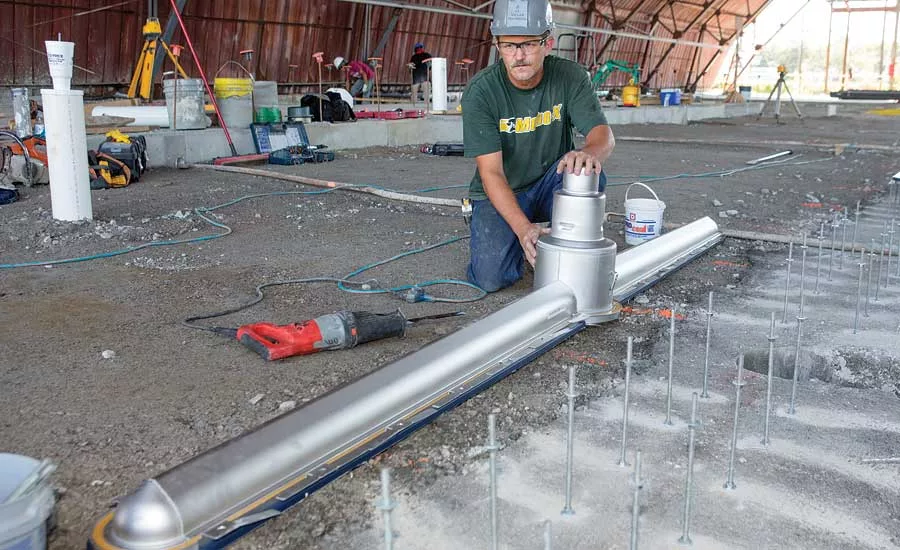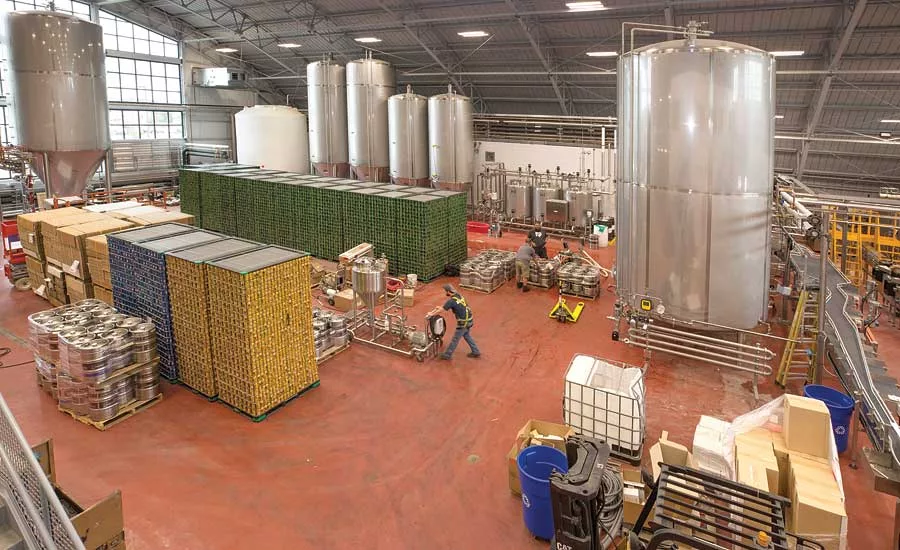Ohio craft brewery receives drain upgrade
Corporate jobs get traded in for craft beers at this Cincinnati brewery.

Ryan Blevins, head brewer (foreground), takes water samples to check temperature and clarity before the mashing process begins. Photo credit: MadTree Brewery/John Evans

MadTree Head Brewer Ryan Blevins washes debris into the HygienicPro drains. Photo credit: MadTree Brewery/John Evans

Denny Peace, an AL Miller plumber, inspects an upside-down, below-grade section of Blücher HygienicPro trench train prior to installation. The drain sections come completely assembled. Photo credit: MadTree Brewery/John Evans

The MadTree brew room is capable of producing up to 180,000 barrels of beer per year. Photo credit: MadTree Brewery/John Evans

A gathering of mployees and patrons enjoy the beer garden. Even canine friends appreciate the ambience of the new outdoor area. Photo credit: MadTree Brewery/John Evans
When three buddies traded in their corporate jobs for craft beers and their suit-and-tie ensembles for beards, they never expected that four years later they’d be co-owners of a 50,000-sq.-ft. brewery stationed in the heart of Cincinnati.
A humble beginning
Kenny McNutt, Brady Duncan and Jeff Hunt began this adventure as homebrewers. Weekends were spent huddled in their basements — the byproduct of which was a malty aroma that permeated carpets and curtains, and small quantities of their now well-respected beers.
The hobby grew and fermented, swelling into a dream they could all see and share.
Eager to ditch their corporate gigs for something they were passionate about — the beer — they also knew Rome wasn’t built in a day. And neither are craft beer empires.
So the trio refined their craft and worked on a business plan — and recipes — for two years with family and friends acting as oh-so-willing guinea pigs. In return, they were asked to render honest, objective judgment. After endless recipe alterations, they perfected their product, and on Jan. 22, 2013, the first official batch of MadTree beer was brewed.
With a humble beginning, the first MadTree brewing facility was a 10,000-square-foot, 15-barrel-per-batch brewhouse with the capacity of brewing up to 22,000 barrels per year.
Today, the finishing touches are being applied to the company’s new brewhouse. Located less than a mile from the original brewery, the new 126-barrel brewhouse facility covers 50,000 square feet with a 20,000-square-foot production area that has the capability of brewing up to 180,000 barrels of beer per year.
The two facilities don’t have much in common aside from the location and the beer. The new brewhouse could swallow the old one whole and still have room for several more.
A 10,000-square-foot outdoor beer garden invites patrons’ canines to join in on the fun — and with outdoor heaters, it’s open year-round.
Community is key
According to Mike Stuart, MadTree’s director of people and social strategy, MadTree focuses on three pillars: beer, people and community.
“Beer quality and consistency of what we create is extremely important to us,” Stuart says. “People — our employees — are treated with the utmost respect and we firmly believe in supporting the community that supports us.”
“Beer gives you an opportunity to discuss many things,” McNutt says. “It’s a catalyst for conversation — it drives and fuels community spirit. We’ve settled on a phrase that’s comfortable and realistic: ‘Beer builds community, and community builds beer.’”
In fact, the majority of MadTree employees were once passionate patrons themselves, so enthusiastic about the atmosphere and end-products that, after time — and many in-depth discussions about beer and business — they were brought on board.
“Aside from my office job, I used to write a local beer blog,” Stuart says. “So after getting to know Kenny, Brady and Jeff through that outlet, I decided to burn my suits and ditch the corporate world.”
An improvement in drain efficiency
At the top of the must-have list when designing the new production facility was the desire to be more efficient and install equipment that would cut water usage, which every brewer knows plays a key role in the brewing process. And water — especially in the quantities needed by MadTree — doesn’t come without cost.
Head Brewer Ryan Blevins says the old facility used 25 gallons of water to clear out a drain in four minutes. Not only were the old drains wasting gallons of water, cracks in the concrete around the edges of the drains had started to appear.
Never before installed in the U.S. — but installed by the kilometer throughout Europe and loved by brewers there — Blücher HygienicPro trench drains were carefully selected for the new facility. Now, Blevins reports that the new drains wash clear in 17 seconds — with just a gallon of water.
“Out on the brew pad, anything from hops to barley to yeast can just hang out in drains and build up,” says Kyle Moore, brewery engineer. “We need to rely on our equipment to wash that stuff down because we don’t have the time to deal with having to spray it down all the time. Volume of water was no small consideration, either. We knew we wanted a product that would optimize water flow as well as the cleaning processes.”
“The design and engineering of the drains made them stand out,” Stuart adds. “They proved to easily evacuate any waste going down the drain and used way less water in doing so. The HygienicPro drains save time, energy and resources.”
The drains’ unique channel geometry results in efficient drainage, even when handling small amounts of water. The drains’ open sides, rounded corners and lack of cavities all contribute to prevent waste and residue from building up.
Even the rounded floor joints reduce the risk of joint deterioration and flooring cracks in polyurethane floor surfacing. The systems’ high-capacity filter baskets collect large amounts of waste, reducing downtime or slowdowns caused by emptying clogged filter baskets.
And, finally, another substantial win for the stainless steel drainage — the extra-hard, ultra-smooth metal surfaces prevent bacterial growth. In the brewery, they encourage the brew process where they want it. Microbial volunteers need not apply and will be washed away.
Flooring folks are fans
It’s not just brewery employees that appreciate the perks of the HygienicPro trench drains. Quick to acknowledge the new drains’ ease of installation was Cincinnati-based A.L. Miller plumber Denny Peace.
“With this being the first ever HygienicPro installation in the U.S., I had no way of knowing what I was getting into,” admits Peace, who installs trench drains regularly. “It’s turned out to be the best trench drain I’ve ever worked with; well made, intuitive and extremely sturdy. I’ve now upped my standards.”
Flooring installers, too, have recognized the technology behind the product.
Kevin Kipp, project manager at Cincinnati-based Hardig Industrial Services, the flooring contractor chosen for the job, appreciates the disposable molding that has a ridge to create a “keyway” around the perimeter of the drain, which is to be removed after the concrete has been poured and before the resinous flooring is installed.
“In a typical trench drain flooring application, we have to manually cut back a keyway in the concrete to install more flooring at the drain,” Kipp explains. “The drain is where the highest rate of failures occur — from expansion and contraction where concrete meets stainless steel. With the molding already taking care of that keyway for us, it’s one less thing we have to worry about.”
Kipp installed resinous flooring throughout MadTree’s production area. The two-part flooring, consisting of a base and a hardener are mixed just prior to application, and a chemical reaction between the two causes the mixture to begin hardening immediately.
“It’s different from anything I’ve ever seen,” Kipp adds. “Drain and transition details are so important but are small details — so many drain manufacturers tend to overlook them.”
Save water — drink beer
“We try to be as transparent as possible with our processes,” McNutt says. “I believe the industry as a whole will grow together when it comes to quality and efficiency. Now we not only get to save water, but we get to clean faster, too.”
Cleaning fast, of course, leaves more time for brewing enterprise and, of course, taste-testing, too!
|
Madtree humor A brewery — what a great place for humor in the workplace. Take, for instance, employee descriptions with job titles like: Thirst Quencher Extraordinaire Jim Conner, whose bartending skills have him receiving fan mail, and Master Chief Beer Officer Adam Lane, who heads up MadTree’s spirited guild of beer ambassadors hell-bent on global domination. Or maybe even Groundskeeper Willie, also known as Jordan Peelman, who can be found “polishing the porcelain throne or wrapping duct tape around something. And if he’s not doing that, he probably has his nose in a pint of Happy Amber.” And oh, by the way, there’s also the name of those drinks they serve on tap. Like, PsycHOPathy and The Great Pumpcan — a seasonal beer that has a “way of delivering Grandma’s baked goodness straight to your pie hole.” |
Story courtesy of Common Ground on behalf of Blücher.
Looking for a reprint of this article?
From high-res PDFs to custom plaques, order your copy today!







